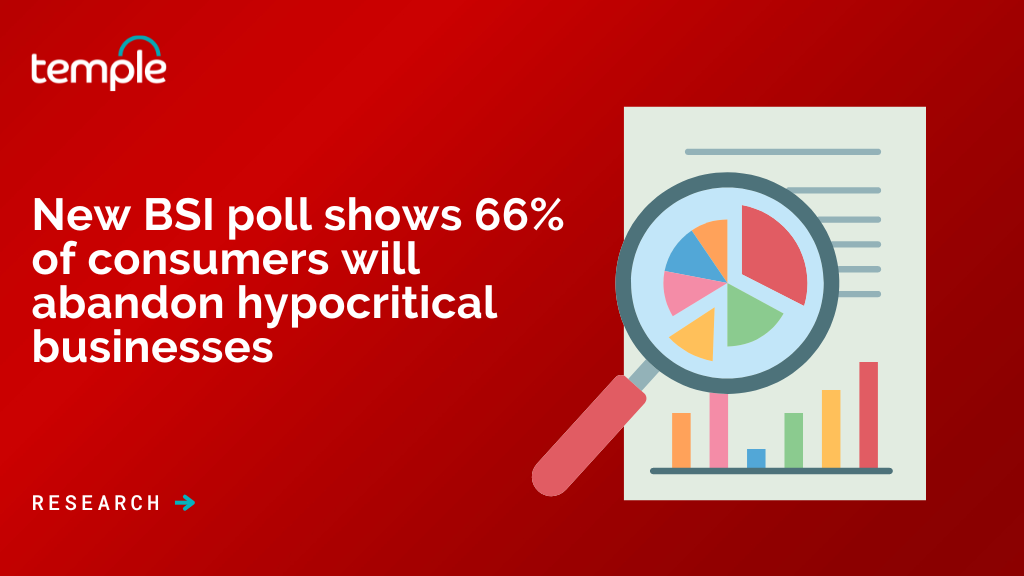
The PSTI Act, a new cyber security law in the UK, takes effect today.
The 29th of April 2024 is an important date for IoT manufacturers and anyone selling connected devices in the UK. This brand new and world-leading

Polling of UK consumers and business leaders reveals that close to half (47%) of consumers consider a company’s purpose when making a purchasing decision and that two-thirds (66%) will abandon a product or business acting inconsistently with its purpose – a sign that consumers have lost patience with organizations that do not follow the principles of purpose-driven organizations.
The data is even starker for younger age groups, with 74% of 18- to 24-year-olds actively considering purpose in buying decisions and 80% of that group saying they will abandon products or businesses acting inconsistently with their purpose. A parallel poll found that younger business leaders between the ages of 18 and 34 were more likely to lead organizations with a purpose beyond profit, with three-quarters of those under 34 saying they did so.
BSI has now published PAS 808: Purpose-Driven Organizations: Worldviews, Principles and Behaviours. This is the world’s first standard offering guidance to organizations globally on what corporate purpose is, what the principles and behaviours of a successful purpose-driven organization are, and how organizations can align their decision-making with their stated purpose. It has been designed to help them restore, rebuild, and embed public trust that they genuinely are purpose-led and committed to doing the right thing.
The survey also found that 68% of all consumers are willing to spend more with an organization that keeps to its stated purpose.
Yet the poll of UK business leaders shows only a fifth (21%) agree that a lack of purpose is detrimental to business, indicating a disconnect between how organizations and consumers view the importance of purpose.
Most, but not all, organizations have a stated, written purpose beyond profit – close to two-thirds (63%) according to the survey. And nearly four-fifths (78%) consider the purpose of other organizations they use or work with. Nevertheless, two-thirds do not frame or measure the delivery of their purpose through an independent third party.
The data shows that almost three-quarters (74%) of business leaders would feel more confident in delivering on their purpose if there was a standardized method. Consumers share this sentiment, with nearly half saying it would be “fairly helpful” and nearly a third (31%) saying it would be “very helpful” if there was a standard that helped assess whether brands were keeping to their purpose.
The new standard published by BSI is a practical guide to help organizations develop their own strategies and approaches to enact and embed purpose in their policies, processes, practices, products, services, and value networks. The guide establishes common terms and definitions related to the purpose and outlines the worldviews, principles and associated behaviours and activities of a purpose-driven organization.
Anne Hayes, Director of Sectors, BSI said: “The research demonstrates that urgent action is needed to align organizations with a sustainable future. There is a growing consensus that purpose-driven organizations may hold the key and that there could be a clear dividend to business purposes.
“We live in an age where organizations that lose the trust of their customers also stand to lose their business. PAS 808 represents a watershed moment in helping them meet the pressing challenge of aligning their purpose with their actions. We are proud to have convened a range of stakeholders to demystify what a good purpose-driven organization looks like and provide a framework for accountability.”
The standard is freely available to download here.

The 29th of April 2024 is an important date for IoT manufacturers and anyone selling connected devices in the UK. This brand new and world-leading

Dave Treadwell, VSUK Quality Manager and subregion Coordinator for VSNE covering Holland and Germany, takes us through his experience of becoming a CQI Fellow and

Temple QMS is delighted to be supporting the roll out of new grant funding in the Shropshire region. We will be supporting SME manufacturing businesses

Global Compliance – Online event This presentation from Management Consultant Peter Lee, will be held 15 May 2024 – 19:00 – 19:45 CE and UKCA